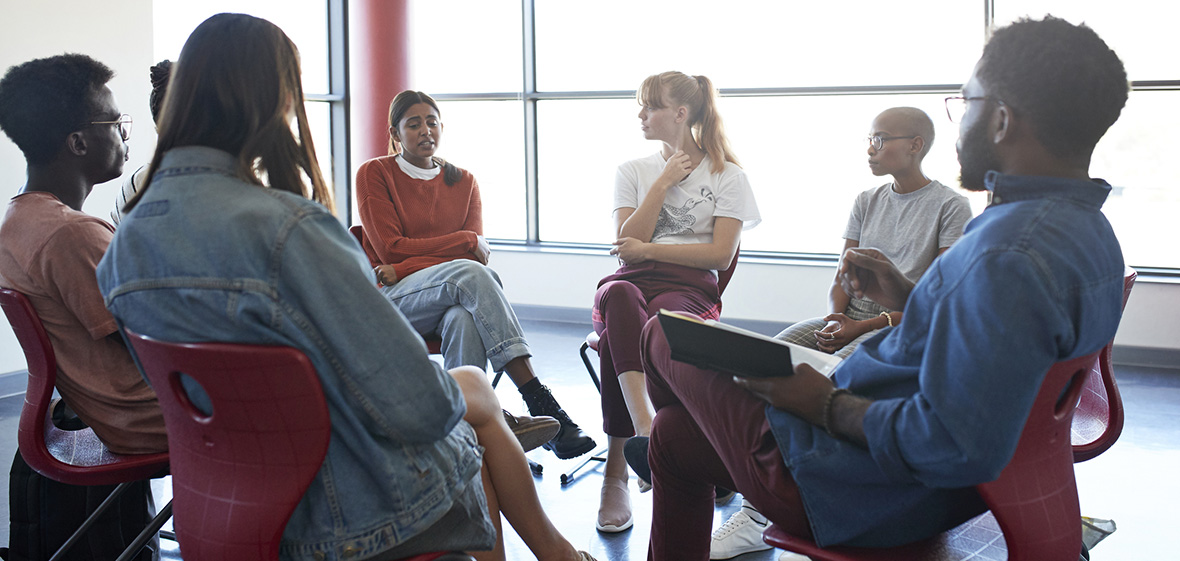
If you have experienced trauma or are suffering from a mental or major health condition, you may find it helpful to talk with someone who has personal experience with the same challenges you have. Fortunately, peer support services have been growing quickly recently. Having a good peer support specialist or support group can positively impact you as a patient, as well as the health care system.
In a peer support group, people with a shared health condition or health challenge meet in a confidential, safe environment for mutual support, according to Peer Support Circles. In contrast, a peer support specialist who has had the same health challenges as you will meet with you privately.
Your peer support group members or peer support specialist will provide advice and useful resources, and you and they can ask each other questions. The group members or specialist will also provide you with opportunities to be accountable and use the tips you learn.
According to Mental Health America and Peers for Progress, peer support can give you the following benefits:
- Peer support can help reduce your total service cost.
- Peer support can decrease the amount of time you are hospitalized or keep you from being hospitalized.
- Peer support can help you learn more about your health conditions.
- Peer support can improve the health conditions you are experiencing, your perception of those conditions and your self-care skills.
- Peer support can help you be more engaged and satisfied with the support and services your health care system is giving you.
- Peer support can improve your self-esteem.
- Peer support can help you live a more fulfilling life and improve your life expectancy.
Your peer support specialist or support group can encourage you and give you the strength to make the choices that are right for you. The specialist or group can also help you develop goals and work toward them. Peer support specialists and support groups can be crucial for helping patients achieve recovery.
Peer support specialists are not therapists. Your specialist will focus on teaching life skills and helping you live with your health condition or with the trauma that happened to you. As you learn and practice skills your peer support specialist teaches you, you may notice that your life is becoming more fulfilling.
UofL Health – UofL Hospital has different peer support resources available:
- Trauma Survivors Network: UofL Hospital has partnered with the Trauma Survivors Network (TSN), a community of patients and families who are looking to connect with one another and rebuild their lives after a traumatic injury. Joining this community can help build support and provide resources. Visit the TSN website for more information and to join.
- Trauma Support Group: The Trauma Support Group is hosted by the trauma program social workers from 6-7 p.m. Eastern Standard Time (EST) the second Wednesday of each month. The support group is a safe place for trauma survivors and their loved ones to come and connect no matter where a person is in their recovery process. Email Jennifer.Youngberg@UofLHealth.org if you have questions about the group.
- Peer support: UofL Hospital’s trauma support program offers trauma patients an opportunity to talk with a trained peer visitor who can support a newly injured person through a difficult time. Peer visitation aims to reduce isolation and promote the feeling of a sense of belonging and being understood. All our peer visitors have once walked in your shoes from the initial accident, hospitalization, physical rehabilitation and returning home to find a sense of normalcy. Peer support visitors understand the concerns of a trauma patient on a very personal level.
Other peer support groups UofL Health offers include:
- Stroke survivor and caregiver support groups: UofL Health’s stroke care doesn’t end when you leave the hospital. Many stroke survivors and their caregivers experience a range of emotions as they adjust back to normal daily activities. Join us for our free support groups where you can enjoy talking openly with others who share similar experiences. To learn more and join a stroke support group, call 502-645-5425.
- Grief Recovery Method® Support Group: This group will help you through the grieving process of any type of loss, and provides partnerships and guidance to help you. This is a free, eight-week program located at the UofL Health – Peace Hospital – Adult Outpatient Center at 4414 Churchman Ave., Louisville, Ky 40215. The group meets from 6-8 p.m. every Monday. To learn more and sign up, call 502-363-7900.
- Group prenatal care: UofL Health – UofL Physicians – OB/GYN & Women’s Health offers prenatal care groups where women due around the same time get to know each other. They learn about pregnancy together, without the need for an exam room. This ensures moms are engaged in their care and that important health topics are covered. The group allows women to form friendships and discuss what’s important to them. To join a prenatal care group, call 502-588-4400.
UofL Health – UofL Physicians can also refer you to other local, state, national and international peer support resources based on your health condition. If you need a provider, call 502-588-4343.









